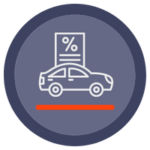Best car loans
We bring together some of New Zealand’s best car loans with the lowest rates to make finding finance for your next vehicle easier.

Updated: 7 September 2025
We’ve refreshed this guide to reflect the latest changes to car loans in New Zealand. Updates include:
- More lenders added to widen your comparison options.
- A new section on responsible borrowing, with tips on keeping costs down and avoiding common pitfalls.
In summary
- Compare car loans from several different lenders to get the best deal.
- Be wary of advertised rates — those will only apply to those in the best possible financial circumstances.
- If you’re looking for business vehicle finance, see our guide.
Author: Kevin McHugh, Head of Publishing at Banked.
Compare car loans
Use our comparison table to find the right car loan for you. Assess loans by advertised interest, terms, and establishment fees.
Both secured and unsecured loans are covered here, but remember that secured loans have lower interest rates.
Rates and fees reviewed updated: 27 October 2025
| Lender | Interest rate (p.a.) | Loan types | Terms | Establishment fee | |
|---|---|---|---|---|---|
 Instant Finance
Instant Finance
|
9.95% - 29.95% | Secured and unsecured | 3 months to 7 years | From $100 to $220 | |
 MTF Finance
MTF Finance
|
9.90% to 23.25% | Secured and unsecured | 3 months to 5 years | Up to $380 | |
 The Co-operative Bank
The Co-operative Bank
|
9.95% to 17.95% | Unsecured | 6 months to 5 years | $200 | |
 ANZ
ANZ
|
13.90% | Unsecured | 6 months to 7 years | $0 | |
 Harmoney
Harmoney
|
7.99% to 24.99% | Secured and unsecured | 3 to 7 years | $150 | |
 Heartland Bank
Heartland Bank
|
8.45% to 12.45% | Secured | 1 to 7 years | $249 | |
 AA Money
AA Money
|
9.40% to 12.15% | Secured | 1 to 7 years | $235 | |
 BNZ
BNZ
|
From 12.90% | Unsecured | 3 months to 5 years | $50 |
6 ways to get the best car loan
Arm yourself with the information you need to get the best possible finance deal for your circumstances.
Settle on how much you want to spend
Decide on how much you want to spend on a car and the time period over which you want to be making repayments.
If you start car shopping first, you could convince yourself to spend more than you can afford. A car loan is something you will be paying off over a few years, so it’s important you don’t overstretch and commit to an amount you will struggle to pay off.
Having a maximum amount you are willing to spend in mind can also put you in a stronger position when you’re at the car dealership. Being prepared to walk away from negotiations because a dealership is reluctant to meet your price is a powerful way to get concessions on a price.
Know your credit score
Your credit score plays a major role in deciding what interest rate you get on your car loan. If you know what yours is, you will have a better understanding of what interest rate you can expect or if you will have difficulty getting a loan.
Having this knowledge can also be helpful when it comes to negotiating a rate. If you know you have a great credit score, you also know you should be getting a lower rate on your car loan.
You can check your credit score for free at Centrix, illion, or Equifax.
Compare a range of options
Get quotes from different lenders to find out who can offer you the best interest rate on your loan. This is possibly the most useful tip we can provide when it comes to looking for a loan.
It may be easy to go into a car dealership and accept the car finance package they can provide through their lender, but it’s unlikely that this will be the best option for you.
The dealership will almost certainly be incentivised to push a particular loan on you, even if it’s not in your best interests. Learn more about the pros and cons of arranging finance through a lender vs a dealership further down.
Be sure to check the fees involved, especially ones that might be unavoidable, like an establishment fee, broker fee, or service fee.
If you do a little homework and get quotes from a few lenders, you will almost certainly be better off.
Use the car as collateral
Loans that use the car you’re purchasing as collateral (a “secured” loan) have lower interest rates than unsecured loans. Why? Because they involve less risk to the lender.
If you fail to make repayments on a secured loan, the lender can repossess the vehicle to claim back what they are owed. This is not possible with an unsecured loan (but note that they can still take steps, including legal action, if you fail to make repayments to an unsecured loan).
Choosing a secured loan will result in a lower interest rate, and it’s the most common type of car loan for this reason.
Save up a deposit
The more of a deposit you have, the less you will have to pay back on your loan, and you can choose to pay off the loan over a shorter time period.
A large deposit also makes you less of a risk to a lender, which means you will have a higher chance of being approved for the loan you need. Once again, you will also be in a stronger bargaining position with the lender as you have proven the ability to effectively manage your money.
Choose the shortest repayment term possible
The shorter the loan term, the less you will pay in interest overall.
For example, let’s say you have a choice of a loan with a 36-month term and another with a 60-month term; both loans involve borrowing the same amount and at the same interest rate.
Even though your monthly repayments will be lower with the 60-month option, you’re taking longer to pay off the total amount. This means that the amount you borrowed has more time to accumulate interest, meaning you pay more in interest over the course of the loan.
This means that choosing the shortest possible loan term (while ensuring you can comfortably meet the repayments) is the smartest choice for many people.
What to watch out for
- Advertised interest rates: Lenders advertise the lowest interest rates they can offer, but these will only apply to those in the best financial circumstances (excellent credit, a good regular income, collateral that can be used as security, and so on). Bear in mind that the advertised interest rate is not necessarily the one you will get on a loan.
- Fees: When looking for a loan, it can be easy to be blinded by a low interest rate. It can be as important to look at what fees are involved. In particular, it’s important to look out for:
- Establishment fees: This is a fee for setting up the loan. They can range from $100 to $1,500.
- Broker’s fees: A fee a broker might charge for arranging the loan with a lender.
- Service fees: A regular, ongoing fee that is charged for servicing the loan. For lenders that charge a service fee, it can be around $10 per month.
- Early repayment fee: A fee for paying the loan off before the agreed term ends. It’s important to bear this in mind if you hope to pay the loan off early.
- Balloon payments: A balloon payment is a large, one-off payment at the end of a loan. Loans with balloon payments can seem appealing as they have fewer total repayments, but the large amount at the end can catch borrowers off guard if they are not prepared.
Responsible borrowing tips
When you see a car loan advertised with a “from” rate, remember that it usually applies only to borrowers with excellent credit and strong security. Most people will be offered a higher rate.
To get the best deal possible, check your credit score before you apply and compare quotes from several lenders. Saving even a small deposit can also help reduce your borrowing costs.
Be cautious with dealership finance. While it might seem convenient, it often comes with higher rates or less flexible terms. Always read the fine print of any loan agreement so you understand the fees, repayment conditions, and what happens if you miss a payment.
How car finance works
Car finance involves borrowing money to purchase a vehicle. You make regular payments to pay off the original amount, plus the interest and any fees that may apply.
The interest rate and the fees you have on your loan will depend on two main factors:
- Your personal circumstances: Including how much you want to borrow, for how long, and your credit history. A lender will take these details into account when deciding what finance terms they will offer you.
- The finance option you choose: This could be directly through a bank or other lender, a broker, or through a dealership. A car loan can also be secured against the car or unsecured.
This guide will help you understand how you can find the best car finance option for you, how to save on interest and fees, and what traps to avoid.
What’s the best way to get a car loan?
You have a number of different options when choosing how to finance a car, and making the right choice could save you hundreds or even thousands of dollars.
We break down each of your options, including the pros and cons of each.
Using a bank or non-bank lender
Arranging car finance directly through a bank or non-bank lender will be the best choice for many. It might take a little more time than other options, but in the end, you can have more confidence that you have found the best deal for you.
These are the steps to getting car finance with a bank or non-bank lender:
- Get quotes from different lenders: You can do this online, in person, or over the phone. Many lenders have online quote tools that let you get an understanding of how much you can borrow without affecting your credit score. This step will also let you know if you meet the eligibility criteria of the lender.
- Check fees, the repayment schedule, and other terms: If you have found a quote you are happy with, the lender has approved your application, and you want to go ahead, make sure you fully understand the terms of the loan. This includes what fees apply and under what circumstances.
- Funds are deposited into your account: Once you have signed the contract, the funds will be deposited into your account. If you have a secured car loan, the lender will want evidence of the seller’s account details before they release the funds.
Pros and cons
Pros
- Putting in the legwork can pay off with the best loan.
- If you have your funding arranged before you start looking for a car, you can focus on finding the right car.
- No broker fee.
Cons
- It will take a little more time and effort.
- If you are self-employed, have bad credit, or you’re in New Zealand on a visa, it will be harder to find a lender that can help you. Find out how to get a loan if you’re in NZ on a work visa.
Using a broker
A finance broker can help you save time, effort, and possibly money by finding a lender for you. They will work with a network of partners to find a loan that meets your particular needs and circumstances.
If you have had difficulty getting approved for a loan or if you’re not happy with the terms you’ve been offered by a particular lender, a finance broker may be able to help.
Pros and cons
Pros
- A broker will save you time as you won’t have to check individual lenders yourself.
- They will assess your circumstances and find a loan that fits.
- If your circumstances mean you’ve been turned down elsewhere, they might be able to help find an alternative.
Cons
- Some will charge you a broker fee for using their service.
- Other brokers don’t charge you a fee, but make a commission from the lender they organise the loan with. As some lenders pay higher commissions than others, you can’t be sure the broker is getting the best deal for you or for them.
Arranging finance through a dealership
Financing your next car purchase through the dealer you buy the car from is the most convenient option, but it’s unlikely to get you the best finance deal.
Firstly, not all dealerships offer car loans. Those that do will probably only partner with one lender, which means the deal you get will be limited to what that lender offers.
With a range of lenders available in New Zealand, it’s unlikely that the one lender the dealership works with happens to provide the best option for your circumstances.
Dealerships may also add a fee on top for arranging the finance, which can range from around $200 to more than $1,000. This is a fee you would avoid if you went to the lender directly. Alternatively, the dealership will get a commission from the lender.
If you do choose to get a car loan through a dealer, remember that everything is negotiable – including fees.
Pros and cons
Pros
- Being able to buy your car and arrange the finance for it in one place makes the process simple.
Cons
- The finance package is unlikely to be the best you could get.
- You’ll likely face a significant fee for the service.
- The dealer may try to tack on overpriced insurance products that will cost you even more.
Can you get a car loan if you have bad credit?
There are a number of lenders in New Zealand who will help bad credit applicants get car finance. If you have already been turned down by lenders, try a broker. A broker won’t be certain to help you finance your next vehicle (or necessarily get you the best deal), but it is an option worth investigating.
If your credit history is not as good as you would like, there are a number of different things you can do to improve your chances of getting approved:
- Use the car as collateral: A loan that is secured against an asset (in this case, the car) is less risky for a lender, and so they are more likely to approve you.
- Apply with another person: Lenders are more likely to approve joint applications because the risk is spread across more borrowers. However, if the person you are applying with also has bad credit, your application is still likely to be rejected.
- Repair your credit rating: This option can take a while but it’s likely the best option in the long term. You can improve your credit rating by paying off your debts (see our guide to debt consolidation loans) and by ensuring you pay bills on time.
Alternatives to a car loan
A home loan top-up
If you have a mortgage, you may be able to borrow more from your mortgage provider in order to fund the purchase of your new car. The most obvious benefit of doing this is the lower interest rate mortgages have when compared to the average secured car loan — the typical secured car loan will have an interest rate that’s twice as high as the average mortgage rate currently.
But that does not mean it’s a good alternative for many people. Because you are likely to be paying your mortgage off over a much longer period, you may end up paying more in interest if you add the expense to your home loan, when compared to a shorter-term car loan.
If a home loan top-up is an option for you, calculate how much interest you would pay overall versus a car loan before you make a decision.
Buying a car with a credit card
Funding the purchase of a car on a credit card is only worth considering under particular circumstances:
- The car you want to buy is relatively cheap: You can only buy a car (entirely) on your credit card if you have a credit limit that’s high enough to afford it.
- You have a low-rate credit card: The lowest credit card purchase rate currently available in New Zealand is around 12%. This does not compare too badly with the rate you could expect with a car loan. It is important to factor in the credit card’s annual fee, however.
- You are disciplined: If you continue to spend on the credit card, it will take you longer to pay off the outstanding amount, meaning you pay more for your car overall.
See other loan guides:



